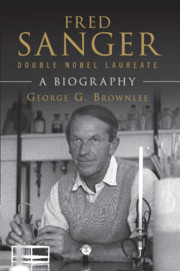Book contents
- Frontmatter
- Dedication
- Contents
- List of figures
- Foreword
- Acknowledgements and original sources
- Brief chronology
- Honours
- Introduction
- 1 A Quaker upbringing
- 2 How about studying insulin?
- 3 Radioactive sequencing of proteins and nucleic acids
- 4 Interview of Fred by the author in 1992: Early life
- 5 Interview of Fred by the author in 1992: Insulin and the Biochemistry Department, University of Cambridge
- 6 Interview of Fred by the author in 1992: Nucleic acids at the MRC Laboratory of Molecular Biology, Cambridge
- 7 Post-Sanger sequencing: high-throughput automated sequencing
- 8 Cancer: the impact of new-generation sequencing
- 9 Commentaries on Fred Sanger’s scientific legacy
- Epilogue
- Appendix: Complete bibliography of Fred Sanger
- Notes
- Index
- Plates
2 - How about studying insulin?
Published online by Cambridge University Press: 05 November 2014
- Frontmatter
- Dedication
- Contents
- List of figures
- Foreword
- Acknowledgements and original sources
- Brief chronology
- Honours
- Introduction
- 1 A Quaker upbringing
- 2 How about studying insulin?
- 3 Radioactive sequencing of proteins and nucleic acids
- 4 Interview of Fred by the author in 1992: Early life
- 5 Interview of Fred by the author in 1992: Insulin and the Biochemistry Department, University of Cambridge
- 6 Interview of Fred by the author in 1992: Nucleic acids at the MRC Laboratory of Molecular Biology, Cambridge
- 7 Post-Sanger sequencing: high-throughput automated sequencing
- 8 Cancer: the impact of new-generation sequencing
- 9 Commentaries on Fred Sanger’s scientific legacy
- Epilogue
- Appendix: Complete bibliography of Fred Sanger
- Notes
- Index
- Plates
Summary
Fred Sanger started his research in arguably the best-known biochemistry department in Britain in 1940 under the leadership of Frederick Gowland Hopkins. Hopkins, affectionately known as ‘Hoppy’, held the first Chair of Biochemistry in Cambridge from 1914 and had modernised biochemistry in the UK. Biochemistry had lagged behind advances in this subject in Europe, and particularly in Germany, in the previous century. The subject had evolved from physiological chemistry and was originally a branch of physiology with a chemical bias. But Hopkins, as the first Professor of Biochemistry in Cambridge – although not the first in the UK which was in Liverpool University in 1902 – established a vibrant British school of biochemistry even though he had an unconventional training as an analytical chemist and medic and had never formally studied biochemistry himself. ‘In Hopkins two things were significantly combined: the training and tastes of an organic chemist, and the imagination of a biologist and physician.’ A careful and committed experimentalist, he had brought Cambridge fame through his discovery of vitamins as accessory food substances needed in minute quantities, for which he was awarded the Nobel Prize in 1929. But his engaging, friendly and benign personality meant that ‘Hoppy’ headed an open and enquiring department, where no subject, including politics, was off-limits. He was popular and approachable with the advanced Part II students. He had appointed talented and sometimes controversial scientists, such as J. B. S. Haldane, Joseph Needham, Malcolm Dixon, Bill Pirie, Ernest Baldwin and Robin Hill. Among his appointments were the women scientists Dorothy Moyle (later Needham) and Marjorie Stephenson who became eminent in their fields. Hans Krebs and Ernst Chain – fleeing persecution from Nazi Germany and both to become future Nobel prize winners – were made welcome by Hopkins in the 1930s. In fact the department was affectionately known by some as the ‘Hopkins Matrimonial Agency’ because of the number of marriages between research workers and ‘Little Moscow’ because of the left-wing tendency of the Needhams, Pirie and others.
- Type
- Chapter
- Information
- Fred Sanger - Double Nobel LaureateA Biography, pp. 9 - 15Publisher: Cambridge University PressPrint publication year: 2014



